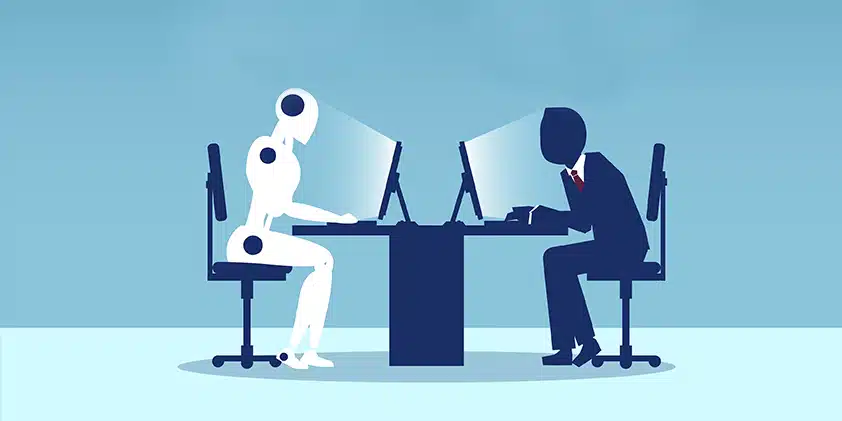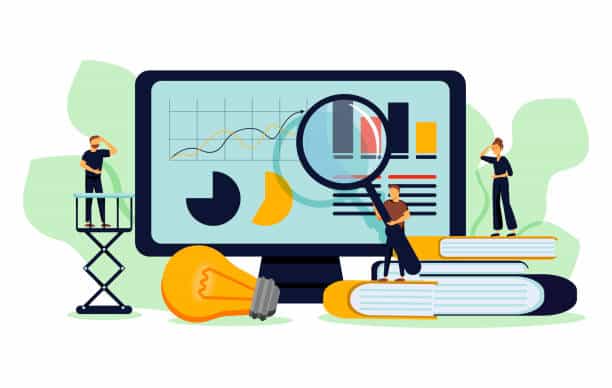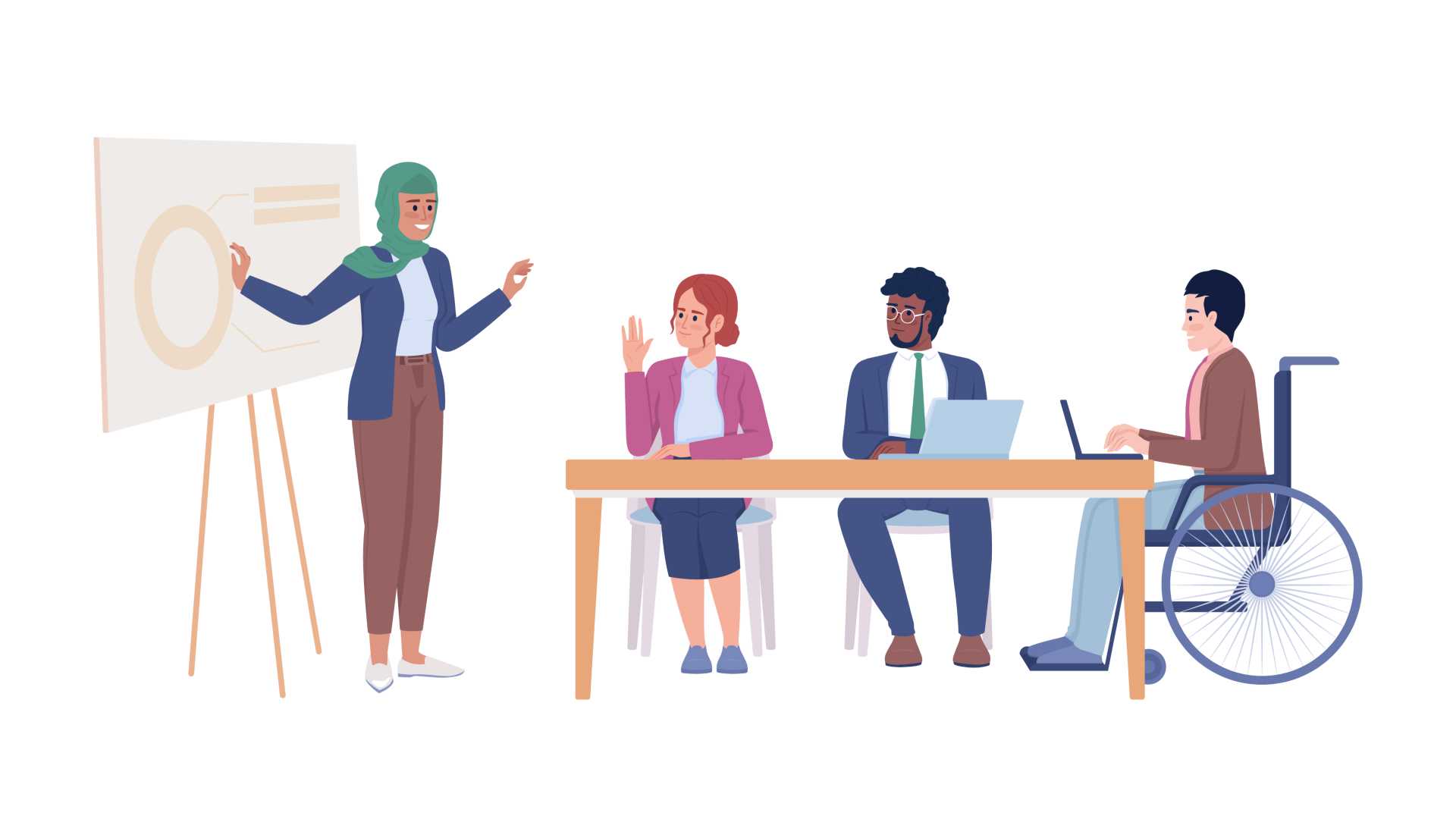Would you trust a bot to source your next star employee? Or let AI conduct your hiring interviews? The future is already here and it’s not an exaggeration to say that recruitment as we know it is about to be completely transformed.
Aws Ismail, Director at award-winning technology recruitment company Marc Ellis, is among those at the cutting-edge of digital transformation in hiring. He and the team at the Marc Ellis office in Dubai are putting the final touches to new technology which will automate sourcing job candidates and enable interviews to be carried out by an AI-based bot.
The potential of the AIVI platform – it stands for Artificial Intelligence Virtual Interview and is pronounced ‘Avee’ – is equal parts exciting and terrifying. It promises to dramatically reduce time to hire and the number of hours recruiters spend on the initial stages of hiring, including scrolling through LinkedIn and making contact with potential candidates. But it also begs the question: where do people fit into the process? And will AI eventually replace human recruiters altogether?
What is AIVI technology?
As a tech recruitment business specialising in the Middle Eastern market, Mr Ismail explained that the company has always incorporated technological expertise in its USP to keep abreast of client expectations. Two years ago, Marc Ellis became the first recruitment company in the UAE to establish an office in the Metaverse, so international clients could meet with recruiters in a virtual space that is an exact replica of the company’s Dubai headquarters.
“A lot of our clients were also requesting people with an understanding of artificial intelligence, so we started looking deeper into it,” Mr Ismail said. “We decided that automation was the way forward – in particular, RPA or Robotic Process Automation (technology that makes it easy to build and manage robots that behave like humans when interacting with digital systems).
We’ve gone from having our recruiters conduct a three-stage interview to a one stage interview based on culture and overall fit, speeding up the process dramatically
“We decided to work on a bot which manages your LinkedIn – adding contacts, having conversations, filtering, determining if someone is interested in a new role – all of the initial part of sourcing candidates. We realised that this was really going to speed up recruitment and save us a lot of time.
“Then, a colleague and I started to discuss how we could improve on this and take it to another level.
As a business that often prepares candidates for interviews, we realise a lot of people don’t conduct themselves well in interview situations – they might have the knowledge and skill set, but then they get nervous when sitting in front of the interviewer. We did a survey that found that 80% of people fail interviews because of lack of preparation in how to conduct themselves.
“We realised AI could be a big fix for interview training, so people could repeat the interview scenario once, twice, 10 times if they wanted to, until they felt confident.”
The AIVI platform works with a VR headset, but it can also be used with a standard computer and webcam. The candidate enters a virtual interview room to be greeted by the AI interviewer, who will establish a rapport and start asking questions.
“We feed AIVI the job description and it will generate its own questions based on that,” Mr Ismail explained. “The candidate’s answers will be instantly analysed, assessed, and given a score out of 10. And it’s not just about your answers – AIVI will assess the level of eye contact and whether you sound nervous. When the interview is finished, AIVI will tell you if you’ve passed or failed, which is an added benefit given that a lot of candidates complain about not getting feedback. It’s exactly like a normal interview, except it’s being done by a robot. And the beauty of artificial intelligence is that it’s always learning, so the more people the AI bot speaks to, the smarter it gets, and the more detailed its answers.”
AI benefits for mass hiring
There are obvious benefits in terms of accelerated hiring and streamlining of the recruitment process, especially for companies conducting mass hiring campaigns. Several big corporates have already expressed their interest.
Currently, the Marc Ellis HR and TA teams are trialling the technology for their own recruitment needs ahead of an anticipated public launch in the first half of 2024. The company plans to make the platform available to other companies on a subscription basis – customers can even brand the virtual interview room and interviewer with their corporate logo and colours.
“It’s working very well and our clients are happy – we’re servicing people very quickly internally,” Mr Ismail said. “As AIVI interviews for skill set and gives us a transcript with scores, all we need to do is interview candidates for cultural fit. Do they fit the business? What are their plans? We’ve gone from having our recruiters conduct a three-stage interview to a one-stage interview based on culture and overall fit, speeding up the process dramatically.”
“We used to miss good talent because we would have 1,000 applicants apply for a job. Now, whenever we have someone in front of us, we know that they’re a really good candidate.”
As recruiters, we analyse people not just based on what they’re saying but also by looking at the overall package, and as it stands now, AI is not powerful enough to do this. But within a few years, the way technology is improving, it probably can and will replace recruiters, as a lot of different jobs are being replaced by computers
The technology is particularly suited to sectors such as oil and gas, aviation, and retail, where mass hiring campaigns are routine. “Instead of interviewing 1,000 people to hire 100, you interview 300 people to hire 100,” Mr Ismail added.
Will AI replace recruiters completely?
Not in the immediate future at least. Mr Ismail pointed out that, while AIVI whittles down the candidate shortlist, a flesh-and-blood recruiter is still required to make the final assessment and hiring decision. AI can continuously learn from its interactions with humans but its inability to develop emotional intelligence gives human beings the upper hand – for now. “I’ve been asked about this quite a few times and I’ve asked myself, ‘are we creating something that’s going to put me out of business?’ But this is very A to Z. It does what it needs to do, it understands what you’re saying, but it doesn’t have the ability to translate it in an emotional way. It can’t replace a human being when it comes to soft skills and understanding.
“As recruiters, we analyse people not just based on what they’re saying but also by looking at the overall package, and as it stands now, AI is not powerful enough to do this. But within a few years, the way technology is improving, it probably can and will replace recruiters, as a lot of different jobs are being replaced by computers.”
Automating hiring further
Mr Ismail is planning further developments to expand AIVI’s capabilities to cover more of the recruitment cycle. “We’ve got the RPA side, which is about contacting candidates on LinkedIn and other platforms to get their initial interest, and we’ve covered the interview, but what we are missing is the middle part – who is qualifying the candidates by speaking to them? So now, we’re working on a system in which a computer dials a candidate and has a conversation with them, using artificial intelligence. If they pass, then that system will filter them through to an interview.”











